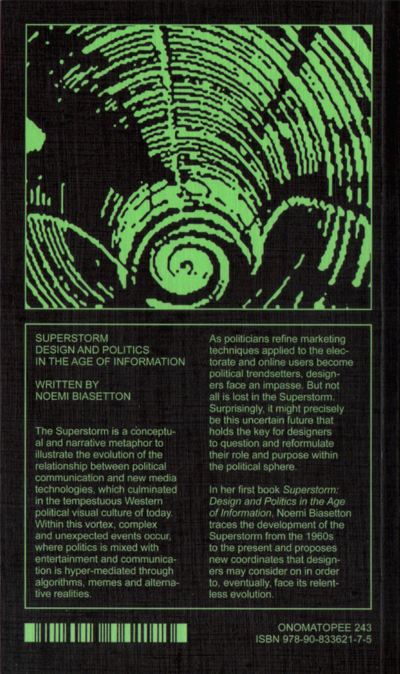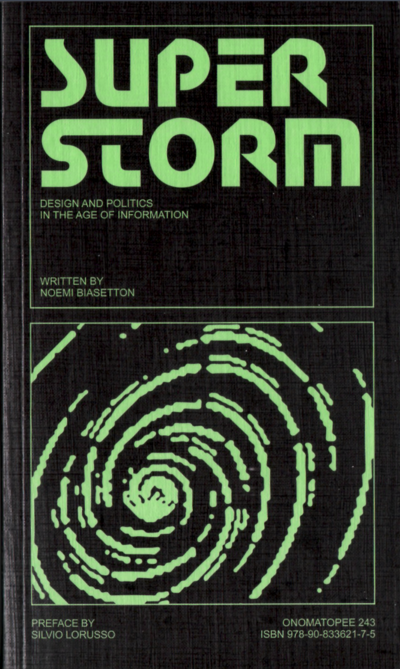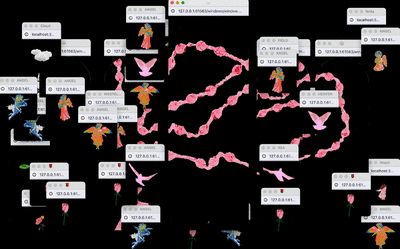[023]
SUPERSTORM. Design and Politics in the Age of Information
Individual
politics

SUPERSTORM. Design and Politics in the Age of Information, 2024 - Cover (Credits: Noemi Biasetton)

SUPERSTORM. Design and Politics in the Age of Information, 2024 Backcover (Credits: Noemi Biasetton)
The Superstorm is a conceptual and narrative metaphor to illustrate the evolution of the relationship between political communication and new media technologies, which culminated in the tempestuous Western political visual culture of today. Within this vortex, complex and unexpected events occur, where politics is mixed with entertainment and communication is hyper-mediated through algorithms, memes and alternative realities.
As politicians refine marketing techniques applied to the electorate and online users become political trendsetters, designers face an impasse. But not all is lost in the Superstorm. Surprisingly, it might precisely be this uncertain future that holds the key for designers to question and reformulate their role and purpose within the political sphere.
In her first book Superstorm: Design and Politics in the Age of Information, Noemi Biasetton traces the development of the Superstorm from the 1960s to the present and proposes new coordinates that designers may consider on in order to, eventually, face its relentless evolution.
16.01.26
[056]
Screen Walks
Collaboration
experimental

Screen Walks < website design by UNSTATED, Leonardo Angelucci >
In Screen Walks, a series of live-streamed explorations of digital spaces, selected artists and researchers investigate artistic strategies taking place online. The project gives an insight into practices using the screen as a medium. Artists, curators and researchers are invited to perform live-streamed explorations of the digital spaces where their core practice takes place. Every Screen Walk is different, as the guest artists of the programme share their screen and walk the viewers through their work, as a desktop performance of sorts. From re-contextualising imagery found on online marketplaces and uncovering data brokers’ invisible circulation of images to analysing in-game photography and the social, political and economic implications of games – Screen Walks examines various approaches, offers a behind-the-scenes look at artists' work and uncovers new, current and forgotten digital spaces.
Screen Walks is a collaborative project by Fotomuseum Winterthur and The Photographers' Gallery, investigating the changing role of the photographic image in its networked and digital forms.
“Fostering cultural exchange and institutional collaboration, Screen Walks aims to engage with discourses and practices generated by a wide range of practitioners. All live-streamed events are freely accessible, regularly archived and openly.”
16.01.26
[057]
The Wretched of the Screen
Individual
politics
In Hito Steyerl’s writing we begin to see how, even if the hopes and desires for coherent collective political projects have been displaced onto images and screens, it is precisely here that we must look frankly at the technology that seals them in. The Wretched of the Screen collects a number of Steyerl’s landmark essays from recent years in which she has steadily developed her very own politics of the image.
Twisting the politics of representation around the representation of politics, these essays uncover a rich trove of information in the formal shifts and aberrant distortions of accelerated capitalism, of the art system as a vast mine of labor extraction and passionate commitment, of occupation and internship, of structural and literal violence, enchantment and fun, of hysterical, uncontrollable flight through the wreckage of postcolonial and modernist discourses and their unanticipated openings.
“Images are no longer passive reflections; they are active agents, manipulated and distorted by the flows of capital and power, reshaping reality in their own fractured, pixelated image.”
16.01.26
[063]
Embodying the browser
Collaboration
experimental

Chia Amisola, Himala, 2024, hypertext website. Courtesy of the artist.
An interview between Meg Miller and Chia Amisola on the development of her practice; from creating browser based environments to translating them into physical performances of the 'ambient internet'. Chia and Meg delve into the concept of embodying the browser as a personal and performative space, transforming websites into lived, immersive experiences. They explore how reading becomes a creative act, akin to authorship, and examines how writing can exist fluidly within data structures, blending code and narrative. With themes of ritual, religion, and repetition, Amisola sees the internet as a potent tool for activism and cultural expression, wielding it as a platform to advance the Filipino struggle and amplify underrepresented voices in the digital age.
I’m interested in reconfiguring our attention to the web: What is visible, invisible, foregrounded? How does poetry emerge from the landscape of the browser?
In this conversation, Amisola explores the agency inherent in 'embodying' technology, where her poetic, chaotic and calming performances reveal how online spaces can become canvases for self-creation, transformation and sharing. Her work in Internet art performance highlights the potential of digital spaces as extensions of (cultural) identity.
Amisola's approach to digital embodiment can critically inform how we view fashion as a social system in online spaces. By 'authoring' identity - through online fashion, words or images - the digital self can become both publisher and platform, forever shifting, growing, shrinking as an evolving interface.
“If Ursula K. Le Guin described technology as the “active human interface with the material world,” I also attempt to become a technology myself.”
16.01.26



